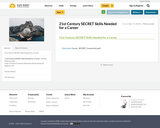
21st Century SECRET Skills Needed for a Career.
- Subject:
- Education
- Material Type:
- Activity/Lab
- Homework/Assignment
- Date Added:
- 09/14/2018

This collection features teacher recommended experiences to support Grade 8 Grade Alike Planning.

21st Century SECRET Skills Needed for a Career.
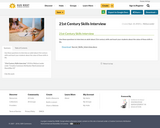
Use these questions to interview an adult about 21st century skills and teach your students about the value of these skills in life.
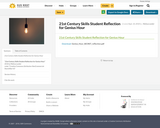
21st Century Skills Student Reflection for Genius Hour
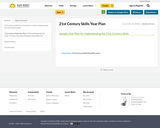
A Year plan to guide your classroom or school in implementing the 21st Century Skills
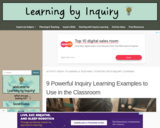
The inquiry learning examples below will give you some ideas for launching a successful project or unit with your students. Moreover, they are engaging, motivating, and challenging for all grade levels.
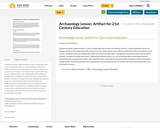
Students working collaboratively on a mini-archaeology dig to locate and identify artifacts, create hypotheses about the objects and what information they tell us about a society, and research past artifacts to determine if their hypotheses were correct. Students had to use collaboration when working on the dig, when creating their hypotheses, when measuring the artifacts, and when forming conclusions. Additionally, students had to use critical thinking when formulating theories, researching and reviewing data online, assessing their ideas, analyzing and comparing their hypotheses with archaeology studies online, and when justifying their hypotheses (and proving them) with the artifact data they discovered online, and forming conclusions.

CK-12 Foundation gives access to high quality educational materials for K-12 students all over the world.
They have high-quality, standards-aligned, open content in the STEM subjects.
This is an OUTSTANDING resource. Be sure to check out the Math & Science FlexLets
Students - select "switch to student version" from the top menu.

An inquiry-based project to map the land in your community. The key concepts in this unit are grounded in Indigenous beliefs of interconnectedness, connectedness, and respect for all things.
The driving inquiry questions for this unit are:
1. How can respect for the land be shown?
2. What do we look for when setting up a camp?
3. What stories or teachings are connected to key locations in and around our community?
4. How has the land around our community changed over time?
5. Who do we share our community’s lands with?
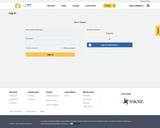
Students examine consumer choices and fair trade in this excellent grade 7/8 project. Choices are available for I DO, WE DO and YOU DO.
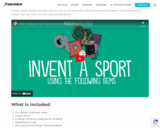
By signing up with your email address and clicking the yellow subscribe button, you will receive this great design thinking project that your students will love! It is part of a design thinking toolkit and includes a free design thinking project, an eBook, and a suite of assessments. You will also receive a weekly email with free, members-only access to the latest blog posts, videos, podcasts and resources to help you boost creativity and spark innovation in your classroom.

Milk, leche, lait. No matter what you call it, real milk offers tons of nutrition and is sustainably produced—and we've got the receipts. Come behind the scenes on a tour of a virtual dairy farm. There are 5 sections to work through, when you complete the section, your milk jug fills up!!!
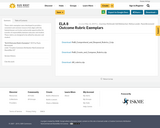
These 4 point rubric exemplars were developed to provide a consistent and common resource that aligns with the Saskatchewan curriculum and provide opportunities for transfer of responsibility between educator and student. These rubrics are designed to be edited by educator and student.

This is a collection of tools to assess the effectiveness of family engagement in a school's learning community.

A lesson using Farm 360 Virtual Tour and linking it to Science and Careers. The students will move around a 360 video to experience life on a farm or orchard. It outlines production and importance of the industry. There is an ELA writing component at the end of the lesson to be handed in.
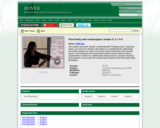
Join spoken word poet Janelle “ecoaborijanelle” Pewapsconias. Using flow poetry, you and your students will explore our Saskatchewan watersheds and water systems as a topic of focus for poetic expression and scientific inquiry. The broadcast will include performances by the artist as well as opportunities to observe a collaborative writing process, practice induction and deduction, and assess the created piece based on the flow poetry skills developed.
*Note - this will only work for Saskatchewan teachers logged into the Ministry of Ed licensed resources.

Please find the required PowerPoint presentation below. This workshop has been developed as part of the course Parents in Teaching and Learning (ECUR 823) at the University of Saskatchewan with professor Debbie Pushor.This workshop is meant to be personalized. Select the activities you wish to discuss, and spend as much or as little time on the concepts that speak fully to your school. As you select activities and where to put your focus think of what needs to be done as a school and as a classroom teacher before school begins, during school, and over the summer. Pick and choose the activities that best fit your school and your school’s needs.If you have any questions, feedback, or require clarification please feel free to call or email Melissa.lander@sunwestsd.ca.
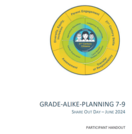
On June 10, 2024, the Sun West School Division Grade-Alike Planning Team hosted a Share Out Day in which they presented their collaborative projects and provided links to all resources explored throughout the year. The teacher recommended resources for Grades 7, 8, and 9 are available in the GAP Hub. This participant handout contains information about each of the learning topics and includes learning outcomes and links to informative websites as recommeded by the guest presenters.
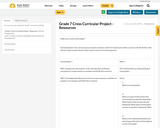
A cross curricular project for Grade 7 in Social and Math.
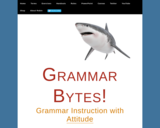
An excellent resource for grammar minilessons and activities that follow the transfer of responsibility model. Great videos and opportunities for We do and You do.
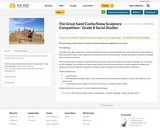
This mini inquiry unity connects to various outcomes explore throughout the curriculum.